

LB-102 Livre blanc (7 1/2” x 8 1/2”) - Alphabetix. Pinterest. Creating Conferring ToolKits. Textes d'opinion. Abécédaire des onomatopées ! : Autres bébé par boumbadaboum. Tips for Managing Writer's Workshop- in KINDERGARTEN! In today’s post, we are going to talk about how to organize Writer’s Workshop so that it can be done in Kindergarten when you have NO HELP!
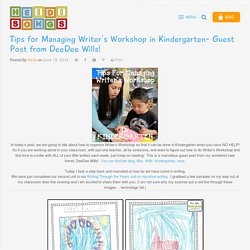
So if you are working alone in your classroom, with just one teacher, all by lonesome, and want to figure out how to do Writer’s Workshop and find time to confer with ALL of your little writers each week, just keep on reading! This is a marvelous guest post from my wonderful new friend, DeeDee Wills! You can find her blog, Mrs. Wills’ Kindergarten, here. Today I took a step back and marveled at how far we have come in writing. We have just completed our second unit in our Writing Through the Years unit on narrative writing. Here are some of the anchor chart that we are using to guide our thinking. By studying the work of other authors, we can learn the qualities of good writing. We used this chart all unit long to help with our spelling independence. Because we launched writing books this month, this was a chart that was essential. Give it time. Tips for Managing Writer's Workshop- in KINDERGARTEN! A meeting place for a world of reflective writers.
Publishers. Stenhouse Publishers. Critiques littéraires - Jules on Vimeo. The Reading & Writing Project - Publications for Teachers. Following in the wake of the success of the Units of Study in Opinion, Information, and Narrative Writing and Units of Study in Argument, Information, and Narrative Writing, the entire Project has been hard at work on a new set of books; Units of Study for Teaching Reading Series, Grades K-5!
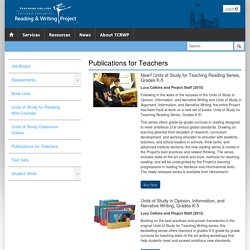
This series offers grade-by-grade curricula in reading designed to meet ambitious 21st century global standards. Drawing on learning gleaned from decades of research, curriculum development, and working shoulder-to-shoulder with students, teachers, and school leaders in schools, think tanks, and advanced Institute sections, the new reading series is rooted in the Project’s best practices and newest thinking. The series includes state-of-the-art charts and tools, methods for teaching reading, and will be undergirded by the Project’s learning progressions in reading for literature and informational texts. The newly released series is available from Heinemann! The Reading & Writing Project - Units of Study Classroom Videos. Pearson School Canada: Units of Study in Opinion/Argument, Information, and Narrative Writing.
The grade-specific series components A Guide to the Common Core Writing Workshop introduces the principles and methods that underlie high-quality writing instruction.
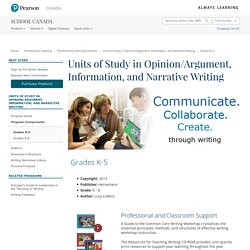
After describing the learning pathways elementary writers typically traverse, Lucy details the classroom structures and instructional frameworks that make writing workshops rigorous and responsive, Select chapters consider how to assess writers and use data to inform your instruction, how to support English language learners, and how to prepare for standardized writing tests. The 4 units of study at each grade level are organized around narrative, information, and opinion writing. Each unit of study contains 18-22 sequential sessions that walk you step-by-step through the entire writing process from planning and drafting to revising and editing and eventually to publication. A book of If…Then… curricular plans supports targeted instruction and differentiation with alternative assessment-based units.
Les ateliers d'écriture au primaire – Inspirés de la démarche des Units of Study du TCRWP. The Reading & Writing Project - Research Base. The Reading and Writing Project’s work reflects some core beliefs and values.
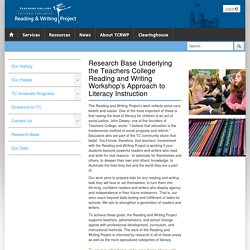
One of the most important of these is that raising the level of literacy for children is an act of social justice. John Dewey, one of the founders of Teachers College, wrote: “I believe that education is the fundamental method of social progress and reform.” Educators who are part of the TC community share that belief. You’ll know, therefore, that teachers’ involvement with the Reading and Writing Project is working if your students become powerful readers and writers who read and write for real reasons - to advocate for themselves and others, to deepen their own and others’ knowledge, to illuminate the lives they live and the world they are a part of.
The Reading & Writing Project - Our Data. The Reading and Writing Project at Teachers College, Columbia University (RWP) tracks progress in our NYC schools using both state test scores and reading levels.
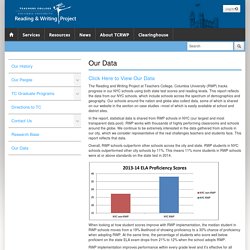
This report reflects the data from our NYC schools, which include schools across the spectrum of demographics and geography. Our schools around the nation and globe also collect data, some of which is shared on our website in the section on case studies –most of which is easily available at school and district sites. In the report, statistical data is shared from RWP schools in NYC (our largest and most transparent data pool). RWP works with thousands of highly performing classrooms and schools around the globe. We continue to be extremely interested in the data gathered from schools in our city, which we consider representative of the real challenges teachers and students face.
Overall, RWP schools outperform other schools across the city and state.